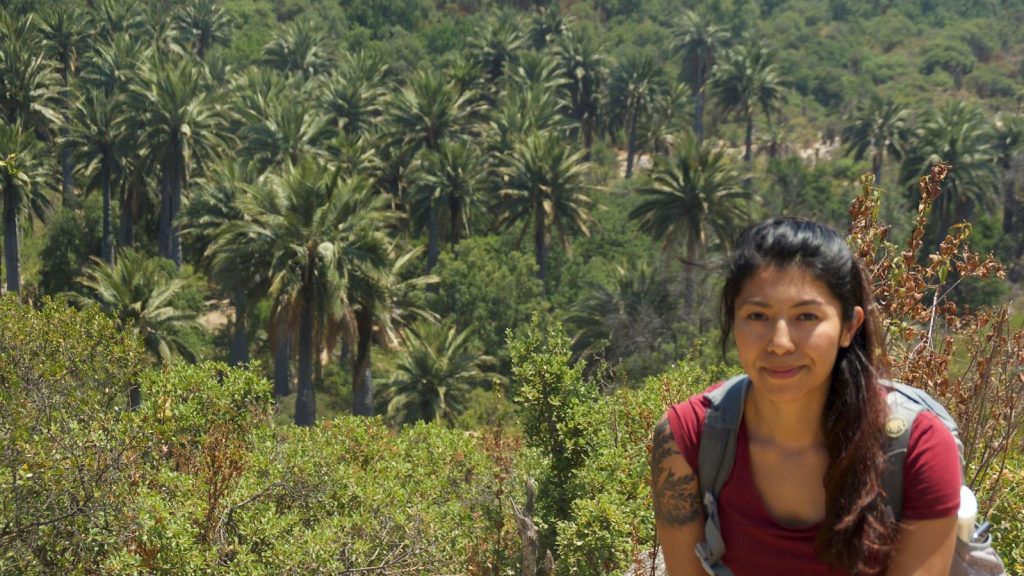A botanist from Colombia has been studying the origins of palms in her country and working with indigenous groups to exchange scientific knowledge.
Colombia has the third highest number of palms of any country, with around 260 species — but 20% of Colombian species are in serious danger of extinction.
Ingrid Olivares, postdoctoral researcher at the Department of Systematic and Evolutionary Botany at the University of Zurich explains that she’s investigating the large-scale patterns of speciation, (that is, how species diverge), in palm trees.
“This work is important because it addresses one of humanity’s fundamental questions: how do species originate?” she says, “Answering this question deepens our understanding of the world around us.”
In a 2023 study, Olivares investigated the genetic diversity of palms in the Andean mountains, finding that there is limited flow of genes between populations even among those in the same mountain.
“Palms are one of the most vital plant families in tropical regions, providing essential services to people in rural communities all around the world as well as to numerous animal species and understanding the ecology and evolution of such an important resource is crucial for us all,” she says.
Another initiative Olivares is working on is called the Múnekañ Masha (‘Let it be (re)born’) project led by community leaders from the Kogi people of Colombia and the NGO Tayrona Heritage Trust, which aims to strengthen a knowledge exchange between scientists and anthropologists on the topic of land restoration.
“Munekan Masha is important because it sets a research agenda led by indigenous partners, reflects their priorities and methods, and develops appropriate frameworks for building synergies between western and indigenous science, all of which are key for creating a sustainable future,” she says.
Growing Up In Bogota
Olivares grew up in Bogota, Colombia, where she earned a bachelor’s degree in biology from Colombia’s Universidad Nacional.
“During my first semester of Biology, I quickly became captivated by the beauty of life itself, she says, “The experience of studying insects and microbes in the lab, coupled with the awe I felt during fieldwork in the mountains and lowlands around Bogotá, deeply inspired me; realizing that nature is full of endless wonders that I can explore and learn about for the rest of my life.”
Olivares, who would go on to complete a master’s degree in ecology at Vrije Universiteit Amsterdam in The Netherlands and a doctorate in ecology at the University of Zurich in Switzerland, explains thatbeing a scientist from the Global South is a “political statement”.
“We live in a time where ‘diversity, equity, and inclusion’ are central to every conversation, research proposal, faculty mission, and academic job advertisement,” she says, “However, many of us still face various biases—some conscious but primarily unconscious; many people, mostly unconsciously, distrust the science, abilities, or knowledge of those from the Global South.”
Olivares explains that hopefully these biases will fade as more diverse scientists contribute to all kind of research areas, and as it becomes normalized to have scientists from all parts of the world.
“I believe that even when two scientists work on the same research problem, they are likely to arrive at different solutions or interpretations because each person brings a unique perspective,” she says, “If science is a quest for knowledge, we must consider as many perspectives as possible, which means including scientists from all parts of the world.”
Documenting Colombia’s Fern Diversity
Colombian botanist Alejandra Vasco is realizing a long-held dream to document the vast diversity of ferns in her home country, racing against time to find new species threatened by climate change and other human activities.
Vasco, a research botanist at the Fort Worth Botanic Garden and the Botanical Research Institute of Texas (FWBG|BRIT) says her current project, which included a recent collecting expedition, will improve humanity’s understanding of how many fern species exist in Colombia, where they occur, and how many of them are threatened with extinction.
“We collected plants that have not been collected in 50 years, and some that are likely not described to science; in 20 days we drove more than 750 km through the Andes, making more than a thousand collections, plus duplicates, that is 4000 specimens – we will be exporting to the US for our careful study by us around 3000 collections,” she says, adding that in some of the places they visited, the diversity of ferns was so high, researchers didn’t have time to collect all the ferns there.
“We want to go back,” Vasco says, “The project is very close to my heart, and I started thinking about it, since I decided I wanted to dedicate my life to the study of ferns.”
Read the full article here






